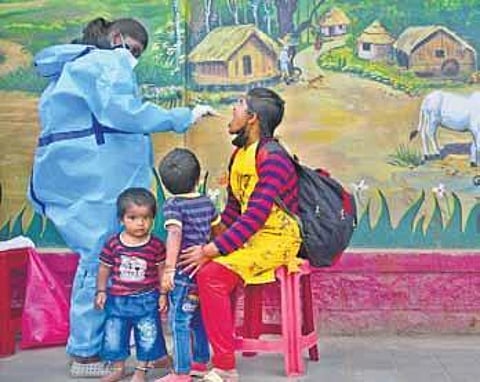

BENGALURU: Despite a low level of pandemic preparedness, the South Asian region has done well in mounting an appropriate response and has shown notably lower rate of deaths due to Covid-19, a study has found. A paper titled 'Pandemic Preparedness and Response to COVID-19 in South Asian Countries' said, "There was a low level of pandemic preparedness in the South Asian region, despite that the region has a lower rate and proportion of deaths attributed to COVID-19, despite case surges similar to the rest of the world."
Authored by researchers from the Indian Institute of Public Health, the Sustainable Development and Climate Change Department of Philippines, and the Emory University School of Medicine, USA, was published last week in the International Journal of Infectious Diseases.Comprising eight countries - Afghanistan, Bangladesh, Bhutan, India, Maldives, Nepal, Pakistan, and Sri Lanka - the South Asian region is home to one-fifth of the world’s population, accounts for 21% of the total reported Covid-19 cases and 11% of deaths worldwide, noted the study.
Initial projections had placed South Asia at a higher risk of suffering more fatalities because of the high population density, greater burden of comorbidities, socioeconomic vulnerabilities and poor healthcare infrastructure.Interestingly, the study found that factors such as a younger population (average age of 25), arrival of Covid-19 pandemic later than in other countries, early lockdowns and some level of general immunity, lack of prompt reporting of fatalities which may have resulted in an underestimation of deaths, may have helped India and other South Asian countries keep the mortality rate down, compared to other countries.
"Early lockdown and timely intervention for prevention and response, potential role of cross-reactive immunity on reducing disease severity, emerging evidence suggesting asymptomatic and mildly symptomatic patients have high SARS-CoV2 specific cytotoxic T-cell responses," could also have helped keep fatalities down.
Lacunae in the system
The study also says that Covid-19 has revealed the vulnerabilities of the health system as a whole. "South Asian nations do not have robust national plans, guidelines, or laws that account for the surveillance and control of multiple zoonotic pathogens of public health concern. Antibiotics are easily available in most of these nations without prescription and can contribute to antimicrobial resistance," Dr Giridhara Babu, senior epidemiologist and one of the authors of the study.
Health care is poorly funded in most of these countries and although laboratories test some pathogens of importance, they cannot test all. All the South Asian countries have an impoverished health workforce and have less than one field epidemiologist per 2,00,000 people. The study noted that the current situation has demonstrated thekind of devastating effect COVID-19 has had on the economies of these countries.
Devastation
The paper also talks about the economic damage, and its spillover impact on the health of people in these countries. “As an after-effect, it is speculated that the South Asian economies will shrink, for the first time in four decades. This will affect the livelihoods and well-being of the people. This could lead to an estimated 132 million people being pushed into extreme poverty. This will also widen the inequalities in the vulnerable group, including a rise in food insecurity and poor health.
These hurdles reverse the gains made by these countries in achieving the Sustainable Development Goals," the study said. In the long run, non-communicable diseases, coupled with inadequate primary healthcare systems, can contribute to higher mortality and morbidity as a result of the Covid crisis, it added. The study calls for introspection and for scaling up preparedness for inevitable pandemics in future, and improving the health of the population overall.